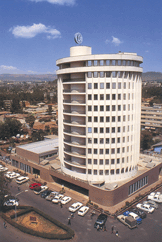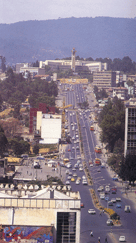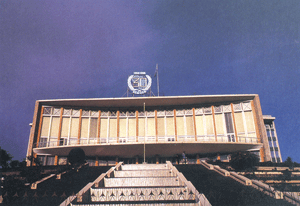Unleashing potential
|
Ethiopia
is refocusing its economy towards previously untapped prospects
writes GLEN MUNRO
|
||||||||||||||||
The current indicators are that lucrative opportunities are available in Ethiopia, after decades of political turbulence. During the regime of Haile Sellassie between 1930 and 1974, the private sector was consistently struggling against government intervention in business. But after Sellassie was deposed, Ethiopia become a socialist state and the collectivastion of agriculture and other economic sectors began. Only after the Soviet- supported military government, known as the Degue, was removed in 1991 did the closed economy of the communist regime replaced with a more open market-driven economy. Despite these conditions, Atilla Yildirim is less than complimentary, at times, when describing his experiences of trading in Ethiopia. "Being an investor in Ethiopia can be like playing with fire," he says. "When I came to this country the Investment Authority and other officials told me so many good things, but after I invested there were a lot of problems and I didn't receive the help promised." Atilla believes the Ethiopian Government has to do more to help foreign companies compete in the world market. "The customs system is import oriented and bureaucracy can be stifling,"he adds. But he readily admits there are numerous advantages of trading in Ethiopia; which attracts millions of US dollars into the country each year and results in a variety of projects being approved. Also, as more state-owned enterprises come up for sale interest among foreign investors is set to increase. Finance minister Sufain Amhed believes trading conditions are very appealing: "An investor who comes and invests here, depending on the type of their investment and the location they choose, will enjoy tax subsidies. In some cases investors may be exempted from customs duties, given free land and offered a number of additional positive benefits." Sufain also emphasises that Addis Ababa, Ethiopia's capital, is a central location for various international bodies. Ethiopia is home to the headquarters of both the Organisation of African Unity and the Economic Commission for Africa. It is also a member of the Common Market for Eastern and Southern Africa. "Investing in Ethiopia means having access to all of these organisations. Additionally, our country is situated strategically close to both the Middle East and the Persian Gulf," he says. Over the last 10 years Ethiopia's economy has also experienced an impressive growth rate of between six to seven percent per annum, despite the war with Eritrea during 1999-2000. The result has been that over the last decade according to the country's Poverty Reduction Strategy Paper, GDP per capital has risen 2.4 per cent a year. What has been particularly beneficial for the economy has the Government's attempt to control expenditure and inflation, which has provided added appeal for foreign investors. Despite the obvious benefits many of the country's sectors remain restricted, making it hard for Ethiopia to persuade big investors that it is fully committed to the private sector. Its telecommunications agency, The Ethiopian Telecommunications Corporation, while now partly up for sale, remains a monopoly. The country has no stock exchange and the banking sector is closed to foreigners. Additionally, while land reform is under way, it remains firmly in the hands of the government. John Cain, director of special events at Nova International, a British company that has organised the Great Ethiopia Run in Addis Ababa for the last two years, strongly believes the country has to change its business culture. "The Ethiopian people are hard working and eager to earn money, they have a cheap labour service and I often think who wouldn't want to set up business here. "Some of the world's biggest companies could be attracted to Ethiopia, if they would only get rid of their road blocks that impede business," he says. During his visit to the country recently, for example, Cain relates how it took two days to clear photography and camera equipment through customs, to film this year's Great Ethiopian Run. Waiting 12 months for a mobile telephone number, and the inability to use a foreign mobile phone in Ethiopia are other major business concerns. Geta Meonnen, managing director of Tewanney Studio, a graphic design company based in Addis Ababa, started his company in 1998. His business is thriving and he now boasts a number of corporative clients as well as employing a staff of 16. Geta says that foreign investors contemplating starting a business in Ethiopia will require an open mind-set. "There is a saying in Ethiopian: If you have patience you will loose it in Ethiopia and if you don't have it then you will gain it," he laughs. "The bureaucracy is a legacy of the communist past. There is a habit of not helping so much, but wanting to control affairs." But Geta, who completed his degree in fine arts at Bristol University, in England, readily admits that if he had wanted to start a similar business in Britain the cost and competition would have made success impossible.
Another problem is that there are no local copyright laws, and therefore no strategic support for local businesspeople like himself. Despite this Mesay is convinced that with time business will grow. "Although there are problems, I am optimistic. We are seeing more and more IT tenders and I think there is a huge market in Ethiopia - and we have the expertise." According to one western analyst, the Ethiopian economy is at a crossroads. He believes the past 10 years of growth has largely reflected the freeing up of an economy that was suppressed for years, releasing pent-up investments. "But that has plateaued out now," says Sufian Ahmed. "The country now has to be more pro-active if it is to continue developing." Sufian adds that there is a lot of work to be done to increase foreign investment but he believes the macro-economic figures are encouraging and reflect a uniquely broad-based growth. More importantly, he says the government is now in the hands of reformers who accept the fact its economic strategy has to be more pro-active. "Industrialisation doesn't come automatically. There is a gap," he says. "That is why we are now working closely with the private sector and we intend to come up with a strategy for increased growth." During a recent visit to London Dr Newai Gebreab, the economic advisor to the Prime Minister, Meles Zenawi, stressed that industrialisation must revolve around the country's agriculture sector, which contributes to 95 percent of the country's export earnings. "This will bring about economic growth, which will eventually result in the country's industrialisation. It is possible because of the size of the population. Many countries in Africa do not stress the importance of industrialisation enough, but the Asian countries have been very successful in this regard," he said.
"Many companies are doing very well exporting flowers, and engaging in soya bean and green peas production," said Belay. "The only concerns that have been expressed at times involve transport problems." A more pressing concern for many investors is finding well-trained, qualified staff to shoulder business responsibility. Although the Ethiopian Government has placed a strong emphasis on investing in education, literacy levels are still low. Approximately 30 percent of children attend primary schools and just 15 percent attend secondary (high) schools. To help counter this, training allowances are now included in the incentive packages offered to investors and a programme of educational reform, which gives greater attention to vocational training, is well under way in the country. "This is one area which we have aggressively embarked on. Currently we have 30,000 people enrolled on vocational courses. Labour is abundant, but a skilled and business-oriented workforce is something we are trying to create. Over the last 40 years Ethiopia's graduates have left the country ( for jobs abroad) and so we are trying to redress this problem," Belay said. Guenet Fresenbet Azimach, from Addis Ababa, is a fashion designer providing haute couture costumes for an international clientele base. She has discovered that her inability to find sufficient numbers of well-trained staff has hampered her ability to expand her company. Guenet says she has to check each garment for quality control purposes, which prevents her devoting more time to the development of other aspects of the business. "I currently cannot handle the number of orders that I receive," she says. Her experience according to many traders in Ethiopia is not uncommon. One sector which is calling out for investors is the tourism industry. The sector is growing steadily, on the back of the country's unique mix of natural, historical, cultural, archaeological and anthropological attractions. Tourism Commissioner Yusuf Abdullahi Sukkar said: "At a local level we cannot always build the type of hotels that we want and so we are encouraging foreign investors. Hopefully his will result in expansion, increase the volume of income and stimulate employment within Ethiopia." Foreign investors are also being sought to assist in the expansion of the sector's infrastructure in the most important destinations, including the northern historical route, the Rift Valley, Omo National Park, Harar and the northern mountains. One foreign-owned company that has invested in the tourist industry, as well as many other sectors in Ethiopia is Midroc Ethiopia. It has opened a number of luxury hotels, including the Sheraton in Addis Ababa. However, the company's mining exploits are currently producing the most dividends. The National Mining Corporation, part of the Midroc Group, exports gold and finished products of marble, loose granite as well as granite blocks to the Middle East, Europe, North America and other regions.
|
||||||||||||||||


